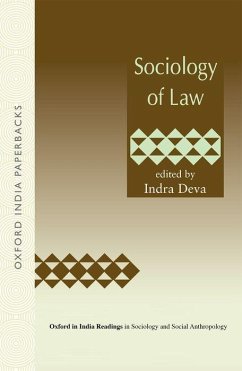- Broschiertes Buch
- Merkliste
- Auf die Merkliste
- Bewerten Bewerten
- Teilen
- Produkt teilen
- Produkterinnerung
- Produkterinnerung
Description This volume, on the sociology of law in India, analyses the relationship between the legal system and other social subsystems, law and religious identity, the societal and social rules of the judiciary in India, as well as the law and social change in India.
Andere Kunden interessierten sich auch für
![The Theory of Committees and Elections The Theory of Committees and Elections]() Duncan BlackThe Theory of Committees and Elections23,99 €
Duncan BlackThe Theory of Committees and Elections23,99 €![Schizophrenia, Culture, and Subjectivity Schizophrenia, Culture, and Subjectivity]() Janis Hunter JenkinsSchizophrenia, Culture, and Subjectivity58,99 €
Janis Hunter JenkinsSchizophrenia, Culture, and Subjectivity58,99 €![Scotland in Theory Scotland in Theory]() Eleanor BELL / Gavin MILLER (eds.)Scotland in Theory111,99 €
Eleanor BELL / Gavin MILLER (eds.)Scotland in Theory111,99 €![The Sociology of Formal Organizations The Sociology of Formal Organizations]() The Sociology of Formal Organizations32,99 €
The Sociology of Formal Organizations32,99 €![Sociology and Anthropology of Economic Life Sociology and Anthropology of Economic Life]() Sociology and Anthropology of Economic Life32,99 €
Sociology and Anthropology of Economic Life32,99 €![Interrogating Ethnography Interrogating Ethnography]() Steven LubetInterrogating Ethnography43,99 €
Steven LubetInterrogating Ethnography43,99 €![An Ambiguous Journey to the City An Ambiguous Journey to the City]() Ashis NandyAn Ambiguous Journey to the City27,99 €
Ashis NandyAn Ambiguous Journey to the City27,99 €-
-
-
Description This volume, on the sociology of law in India, analyses the relationship between the legal system and other social subsystems, law and religious identity, the societal and social rules of the judiciary in India, as well as the law and social change in India.
Hinweis: Dieser Artikel kann nur an eine deutsche Lieferadresse ausgeliefert werden.
Hinweis: Dieser Artikel kann nur an eine deutsche Lieferadresse ausgeliefert werden.
Produktdetails
- Produktdetails
- Verlag: Hurst & Co.
- Seitenzahl: 388
- Erscheinungstermin: 15. Mai 2010
- Englisch
- Abmessung: 142mm x 208mm x 20mm
- Gewicht: 295g
- ISBN-13: 9780198064459
- ISBN-10: 0198064454
- Artikelnr.: 31192447
- Herstellerkennzeichnung
- Libri GmbH
- Europaallee 1
- 36244 Bad Hersfeld
- gpsr@libri.de
- Verlag: Hurst & Co.
- Seitenzahl: 388
- Erscheinungstermin: 15. Mai 2010
- Englisch
- Abmessung: 142mm x 208mm x 20mm
- Gewicht: 295g
- ISBN-13: 9780198064459
- ISBN-10: 0198064454
- Artikelnr.: 31192447
- Herstellerkennzeichnung
- Libri GmbH
- Europaallee 1
- 36244 Bad Hersfeld
- gpsr@libri.de
Indra Deva was Professor Emeritus, Department of Sociology, Pt Ravishankar Shukla University, Raipur, Chattisgarh.
* Introduction;
* Section I: Functioning of the Legal System;
* 1.: Colonial Nature of the Indian Legal System (Upendra Baxi);
* 2.: Administration of Hindu Law by the British (J. Duncan M.
Derrett);
* 3.: Law and the People (V.R. Krishna Iyer);
* 4.: Patterns of Criminal Justice amongst Some Tribes (Krishna Kumar);
* 5.: Law as an Instrument of Change in India (J.S. Gandhi);
* Section II: The Legal Profession;
* 6.: Development of the Legal Profession in India (Samuel
Schmitthener);
* 7.: Legal Profession and Society: A Study of Lawyers and their
Clients (K.L. Sharma);
* 8.: Social Organization at the District Courts: Colleague
Relationships among Indian Lawyers (Charles Morrison);
* Section III: Law and Religious Identity;
* 9.: Religion, Law, and Secularism (Donald Eugene Smith);
* 10.: Personal Laws or a Uniform Civil Code? (John H. Mansfield);
* 11.: The Personal Law Question and Hindu Nationalism (Dieter Conrad);
* 12.: The Shah Bano Case: Some Political Implications (Kavita R.
Khory);
* Section IV: Law and the Disadvantaged Groups;
* 13.: Pursuing Equality in the Land of Hierarchy (Marc Galanter);
* 14.: Jusprudential Foundation of Reservations (M.P. Singh);
* 15.: Mandal Revisited (Ram Jethmalani);
* 16.: Empowerment of Women: Legal Strategies (S.P. Sathe);
* Section V: Societal Role of Judiciary;
* 17.: Towards an Indian Jurisprudence of Social Action and Public
Interest Litigation (V.R. Krishna Iyer);
* 18.: Public Interest Litigation (Mahabaleshwar N. Morje);
* Section VI: Law and Social Change;
* 19.: Growth of Traditional Legal System: The Perspective of Change
through the Ages (Indra Deva and Shrirama);
* 20.: Law and Social Change in India (Yogendra Singh);
* 21.: Constitutions and Revolutions (Peter G. Sack); Contributors;
Index
* Section I: Functioning of the Legal System;
* 1.: Colonial Nature of the Indian Legal System (Upendra Baxi);
* 2.: Administration of Hindu Law by the British (J. Duncan M.
Derrett);
* 3.: Law and the People (V.R. Krishna Iyer);
* 4.: Patterns of Criminal Justice amongst Some Tribes (Krishna Kumar);
* 5.: Law as an Instrument of Change in India (J.S. Gandhi);
* Section II: The Legal Profession;
* 6.: Development of the Legal Profession in India (Samuel
Schmitthener);
* 7.: Legal Profession and Society: A Study of Lawyers and their
Clients (K.L. Sharma);
* 8.: Social Organization at the District Courts: Colleague
Relationships among Indian Lawyers (Charles Morrison);
* Section III: Law and Religious Identity;
* 9.: Religion, Law, and Secularism (Donald Eugene Smith);
* 10.: Personal Laws or a Uniform Civil Code? (John H. Mansfield);
* 11.: The Personal Law Question and Hindu Nationalism (Dieter Conrad);
* 12.: The Shah Bano Case: Some Political Implications (Kavita R.
Khory);
* Section IV: Law and the Disadvantaged Groups;
* 13.: Pursuing Equality in the Land of Hierarchy (Marc Galanter);
* 14.: Jusprudential Foundation of Reservations (M.P. Singh);
* 15.: Mandal Revisited (Ram Jethmalani);
* 16.: Empowerment of Women: Legal Strategies (S.P. Sathe);
* Section V: Societal Role of Judiciary;
* 17.: Towards an Indian Jurisprudence of Social Action and Public
Interest Litigation (V.R. Krishna Iyer);
* 18.: Public Interest Litigation (Mahabaleshwar N. Morje);
* Section VI: Law and Social Change;
* 19.: Growth of Traditional Legal System: The Perspective of Change
through the Ages (Indra Deva and Shrirama);
* 20.: Law and Social Change in India (Yogendra Singh);
* 21.: Constitutions and Revolutions (Peter G. Sack); Contributors;
Index
* Introduction;
* Section I: Functioning of the Legal System;
* 1.: Colonial Nature of the Indian Legal System (Upendra Baxi);
* 2.: Administration of Hindu Law by the British (J. Duncan M.
Derrett);
* 3.: Law and the People (V.R. Krishna Iyer);
* 4.: Patterns of Criminal Justice amongst Some Tribes (Krishna Kumar);
* 5.: Law as an Instrument of Change in India (J.S. Gandhi);
* Section II: The Legal Profession;
* 6.: Development of the Legal Profession in India (Samuel
Schmitthener);
* 7.: Legal Profession and Society: A Study of Lawyers and their
Clients (K.L. Sharma);
* 8.: Social Organization at the District Courts: Colleague
Relationships among Indian Lawyers (Charles Morrison);
* Section III: Law and Religious Identity;
* 9.: Religion, Law, and Secularism (Donald Eugene Smith);
* 10.: Personal Laws or a Uniform Civil Code? (John H. Mansfield);
* 11.: The Personal Law Question and Hindu Nationalism (Dieter Conrad);
* 12.: The Shah Bano Case: Some Political Implications (Kavita R.
Khory);
* Section IV: Law and the Disadvantaged Groups;
* 13.: Pursuing Equality in the Land of Hierarchy (Marc Galanter);
* 14.: Jusprudential Foundation of Reservations (M.P. Singh);
* 15.: Mandal Revisited (Ram Jethmalani);
* 16.: Empowerment of Women: Legal Strategies (S.P. Sathe);
* Section V: Societal Role of Judiciary;
* 17.: Towards an Indian Jurisprudence of Social Action and Public
Interest Litigation (V.R. Krishna Iyer);
* 18.: Public Interest Litigation (Mahabaleshwar N. Morje);
* Section VI: Law and Social Change;
* 19.: Growth of Traditional Legal System: The Perspective of Change
through the Ages (Indra Deva and Shrirama);
* 20.: Law and Social Change in India (Yogendra Singh);
* 21.: Constitutions and Revolutions (Peter G. Sack); Contributors;
Index
* Section I: Functioning of the Legal System;
* 1.: Colonial Nature of the Indian Legal System (Upendra Baxi);
* 2.: Administration of Hindu Law by the British (J. Duncan M.
Derrett);
* 3.: Law and the People (V.R. Krishna Iyer);
* 4.: Patterns of Criminal Justice amongst Some Tribes (Krishna Kumar);
* 5.: Law as an Instrument of Change in India (J.S. Gandhi);
* Section II: The Legal Profession;
* 6.: Development of the Legal Profession in India (Samuel
Schmitthener);
* 7.: Legal Profession and Society: A Study of Lawyers and their
Clients (K.L. Sharma);
* 8.: Social Organization at the District Courts: Colleague
Relationships among Indian Lawyers (Charles Morrison);
* Section III: Law and Religious Identity;
* 9.: Religion, Law, and Secularism (Donald Eugene Smith);
* 10.: Personal Laws or a Uniform Civil Code? (John H. Mansfield);
* 11.: The Personal Law Question and Hindu Nationalism (Dieter Conrad);
* 12.: The Shah Bano Case: Some Political Implications (Kavita R.
Khory);
* Section IV: Law and the Disadvantaged Groups;
* 13.: Pursuing Equality in the Land of Hierarchy (Marc Galanter);
* 14.: Jusprudential Foundation of Reservations (M.P. Singh);
* 15.: Mandal Revisited (Ram Jethmalani);
* 16.: Empowerment of Women: Legal Strategies (S.P. Sathe);
* Section V: Societal Role of Judiciary;
* 17.: Towards an Indian Jurisprudence of Social Action and Public
Interest Litigation (V.R. Krishna Iyer);
* 18.: Public Interest Litigation (Mahabaleshwar N. Morje);
* Section VI: Law and Social Change;
* 19.: Growth of Traditional Legal System: The Perspective of Change
through the Ages (Indra Deva and Shrirama);
* 20.: Law and Social Change in India (Yogendra Singh);
* 21.: Constitutions and Revolutions (Peter G. Sack); Contributors;
Index








